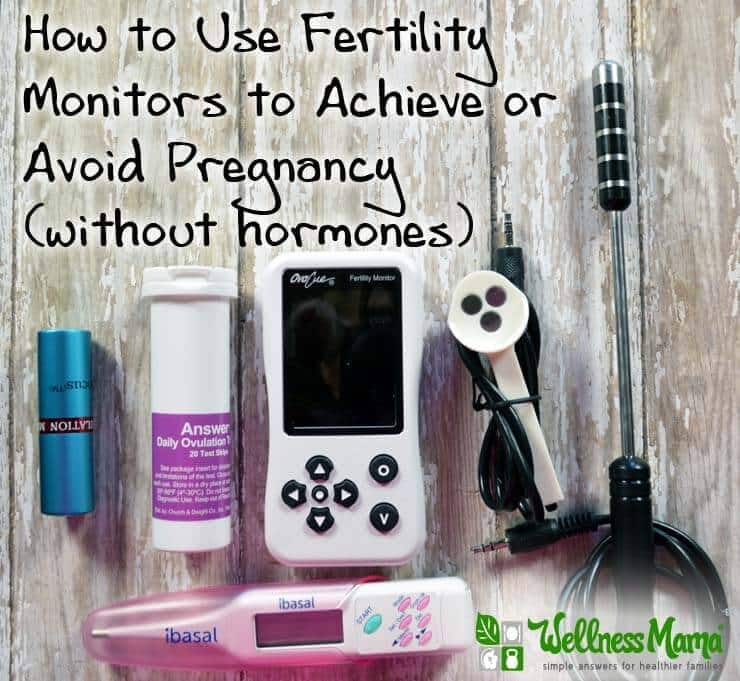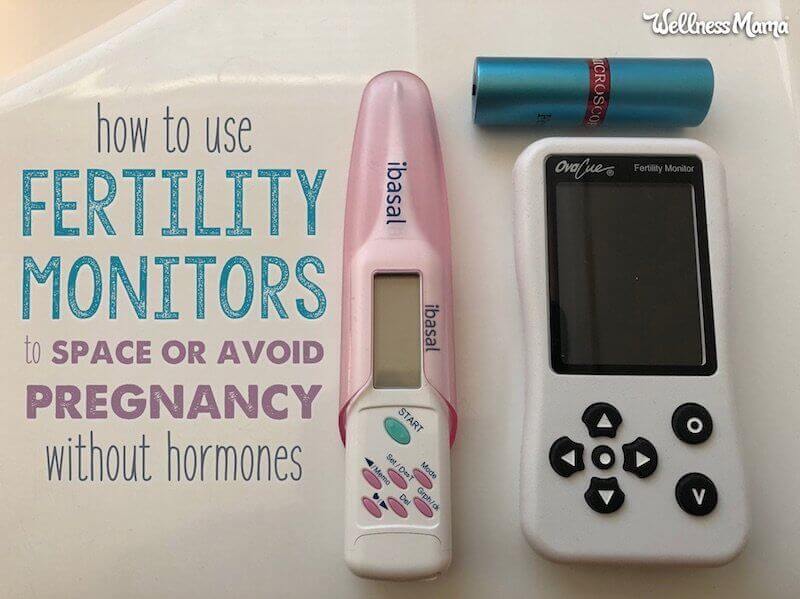As many of you know, I’ve had six children in nine years. I’m certainly open to having more children in the future, but I feel like my body would benefit from a break from pregnancy/nursing, especially as I am working to overcome my autoimmune disease and heal my thyroid.
Why Not Hormones?
I’ve written before about why I choose not to use hormonal or artificial contraceptives and what I use instead. I explained in that post:
Hormonal contraceptives are made from artificial hormone-like substances that attempt to mimic the effects of naturally occurring hormones in the body. Hormonal contraceptives work by:
- suppressing the release of hormones that trigger ovulation;
- stimulating production of thick cervical mucus, which prevents sperm survival and ability to travel to a ripe egg in the fallopian tube in the event that ovulation does occur;
- disrupting the ability of the cilia (whip-like cells that line the fallopian tube) to move a fertilized egg toward the uterus in the event that conception does occur;
- preventing buildup of the uterine lining, and thereby inhibiting implantation of a fertilized egg in the event that one arrives in the uterus.
Personally, the mere possibility that conception could occur and then the fertilized egg could be prevented form implanting is enough to keep me from ever wanting to use hormonal contraceptives.
Problems With the Pill
Artificial hormones like those found in hormonal contraceptives aren’t good for Mom either (or the water supply for that matter).
Sam Epstein, MD and author of The Breast Cancer Prevention Program, explains:
More than 20 well-controlled studies have demonstrated the clear risk of pre-menopausal breast cancer with the use of oral contraceptives. These estimates indicate that a young woman who uses oral contraceptives has up to ten times the risk for developing breast cancer as does a non-user, particularly if she uses the Pill during her teens or early twenties; if she uses the Pill for two years or more; if she uses the Pill before her first full-term pregnancy; if she has a family history of breast cancer.” (emphasis added)
Doing the math, this means a woman who takes the Pill for even just two years before the age of 25 and before she’s had a pregnancy to term increases her risk of breast cancer tenfold.
As I’m not personally a fan of increased cancer risk, and I’m also not a fan of altering my hormones with artificial means. For these reasons I’ve used alternative methods to track my fertility.
How to Test for Fertility
A woman is only cyclically fertile, and within a normal cycle will go from infertile to fertile (for a short window) and back to infertile. Couples who have tried to conceive a child know all too well that there are infertile periods of the month.
Natural methods of achieving or delaying pregnancy depend on knowledge of a woman’s cycle and body to be able to pinpoint the fertile window and use that time accordingly. There are ovulation calculators (and see the other suggestions below) that make this easier to calculate and track based on your specific cycle.
I often hear it said in the health sphere that every body is different and the path to health depends on being able to tune into one’s individual needs. I think this holds especially true when it comes to fertility. So how to listen and know what is going on with your fertility?
Good question!
Natural Family Planning Made Easier
Natural Family Planning or NFP as it is called requires observations of indicators like Basal Body Temperature (BBT), mucus production, cervical position, and other symptoms to predict ovulation. This often means charting these observations to interpret an overall picture of fertility.
You can find a class to teach you how to practice these methods, or there are several apps (this is one of them) that make charting easier. Better yet, there are even computerized devices that connect to these apps and make this process of tracking fertility more accurate and easier to do.
Most fertility monitors are recommended for achieving pregnancy but aren’t labeled for use in avoiding pregnancy or recommended while breastfeeding. I tried to find information on using fertility monitors for these purposes, but there was limited information available.
My Experience Using Fertility Monitors
When given the chance by Fairhaven Health, I decided to test four of these fertility monitors side by side for six months and compare the results to see:
- which were the most accurate;
- if they could be used during breastfeeding or to delay pregnancy.
The four methods I compared side by side were:
Plus I charted my fertility using the Sympto-Thermal method of Natural Family Planning. I also tried a device called OvaCue, but that company is no longer around. This is what I found:
1. Fertile Focus
What It Is: The Fertile Focus uses a microscope to track the changes in the saliva that correspond with changes in fertility. The website explains the FertileFocus microscope:
“Designed by leading fertility expert, Dr. Amos Grunebaum, ObGyn, Fertile-Focus is the affordable high-quality saliva-based fertility test (or personal ovulation microscope) that predicts ovulation with 98% accuracy – up to 72 hours in advance.
Fertile-Focus allows women to identify their most fertile days by testing and viewing the visual changes that take place in saliva throughout the monthly cycle. Just prior to ovulation, women experience an “estrogen surge,” and a distinct fern-like pattern becomes visible in saliva due to the hormonal changes. Fertile-Focus provides the highest quality, powerful 50x magnification lens for easily identifying these crystal “ferning” patterns.”
How I Used It: The Fertile Focus predicts ovulation several days in advance based on the patterns in the saliva. Since I was using the OvaCue while nursing a baby and creating “cycles” for it to track, I used the Fertile Focus as a backup method to show ovulation if the OvaCue missed it. All that is required is to place a small amount of saliva on the fertile focus each morning (before eating or drinking), let it dry and then look at it with the microscope.
The Fertile Focus showed the ferning pattern in my saliva at the same time that my charting showed a rise in fertility and the same time that the OvaCue predicted ovulation. It only gave me about 3 days advance notice, compared to the 7 day notice with OvaCue but it was fascinating to see the change in my saliva.
I liked how portable and easy to use the Fertile Focus was, but prefer the extra data with the OvaCue. The Fertile Focus is also the least expensive of the methods I tried. Though it didn’t provide as much advance notice of ovulation, it did predict it accurately.
2. iBasal Thermometer
What It Is: The iBasal Thermometer is a device that relies on the Basal Body Temperature (BBT) method for tracking fertility and pinpointing ovulation. The iBasal has a built in alarm clock to remind you to take your temperature each morning and it measures temperature to 1/100th of a degree. I’ve charted with the BBT method before but the iBasal charts for you to make the process easier.
The website explains:
Basal body temperature (BBT) charting is a tried and true method for determining precisely when during your menstrual cycle you ovulate. Your basal body temperature is the temperature at which your body rests, which tends to be a bit lower than your “normal” temperature, usually 97 point something degrees F versus 98.6 degrees F. By measuring your BBT each morning (after a full night’s sleep) throughout your cycle you can detect the natural and subtle rise in your basal body temperature that occurs just after ovulation. This post-ovulatory shift in BBT is caused by increased production of the hormone progesterone, sometimes referred to as the “warming hormone.”
How I Used It: I kept the iBasal by my bed and took my temperature with it each morning. While I was nursing and didn’t have a cycle, it showed slight variations in my temperature, but not enough to indicate a shift in fertility. Also, since I was working on improving my thyroid hormone levels during this time, it registered a few false ovulations, though most women (even while nursing) wouldn’t have this variable to deal with.
It did confirm that ovulation had happened after (which corresponded with the other methods I was using) but it didn’t give advance notice.
3. Ovulation Sticks
What It Is: Ovulation sticks use urine to identify a rise in LH (Leutenizing Hormone) that occurs 12-48 hours before ovulation. They are very accurate but don’t give much advance notice of ovulation.
How I Used Them: I use these mainly to confirm what the fertility monitors were saying and confirm that ovulation did occur. They can be pricey and must be bought each month, so they aren’t the best option but they do give an extra way to confirm that ovulation has occurred and that LH levels have dropped. I won’t use these long term but they were useful as an extra way to verify the data from the other machines.
What I Use Now
After comparing all four methods side by side for six months, the Fertile Focus is my top option. The device I use the most often is no longer being made, but Fertile Focus is a good alternative. Another option to try is the Kegg fertility monitor which relies on cervical mucus so it’s more accurate.
There is also a great community at Fairhaven Health of women using these different methods and they have forums where you can ask questions and get advice.
As I’m trying to temporarily avoid pregnancy, I’m using these methods to pinpoint my fertile window so I can avoid getting pregnant, but the same technology is excellent at helping pinpoint ovulation to achieve pregnancy.
With this existing technology and as more research and innovation happens, fertility monitors provide an alternative to hormonal contraceptives and also allow women to know and understand their bodies and possibly identify hormonal problems.
This article was medically reviewed by Dr. Anna Cabeca, a gynecologist and obstetrician and a menopause and sexual health expert. As always, this is not personal medical advice and we recommend that you talk with your doctor.
Have you ever used a fertility monitor or natural family planning method? Please share what worked for you below!





Leave a Reply